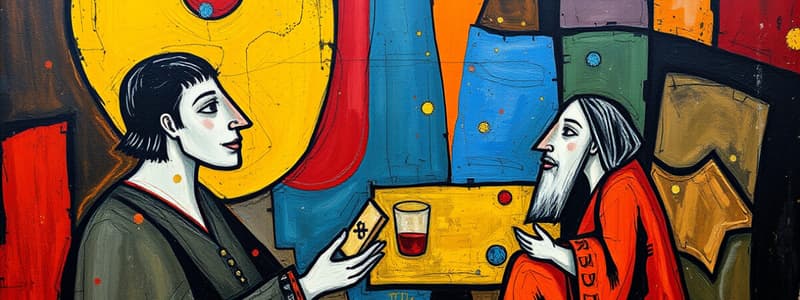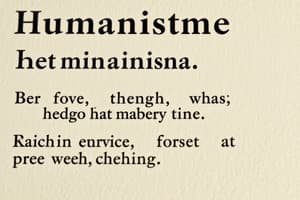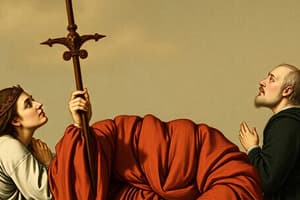Podcast
Questions and Answers
What is Humanism?
What is Humanism?
- A religious reform movement
- A Renaissance intellectual movement focusing on human potential (correct)
- A political ideology
- An artistic style
Who is considered the father of Humanism?
Who is considered the father of Humanism?
Petrarch
What did Jean Calvin stress in his doctrines?
What did Jean Calvin stress in his doctrines?
Predestination
What was the Protestant Reformation?
What was the Protestant Reformation?
Which German theologian was a key figure in the Reformation?
Which German theologian was a key figure in the Reformation?
What are the 95 Theses?
What are the 95 Theses?
Who was Ulrich Zwingli?
Who was Ulrich Zwingli?
What was the Hundred Years War?
What was the Hundred Years War?
What did François Rabelais critique in his work 'Gargantua'?
What did François Rabelais critique in his work 'Gargantua'?
What is 'The Prince' about?
What is 'The Prince' about?
What is the Sorbonne?
What is the Sorbonne?
What are the Humanities?
What are the Humanities?
Who was Erasmus?
Who was Erasmus?
What does 'The Praise of Folly' address?
What does 'The Praise of Folly' address?
What is Christian Humanism?
What is Christian Humanism?
What does 'Oration on the Dignity of Man' discuss?
What does 'Oration on the Dignity of Man' discuss?
Who was Sir Thomas More?
Who was Sir Thomas More?
What is the Enlightenment?
What is the Enlightenment?
Flashcards are hidden until you start studying
Study Notes
Humanism
- Renaissance intellectual movement emphasizing classical texts and human potential.
- Focused on achievements of individuals, moving away from solely religious themes.
Petrarch
- Known as the father of humanism, he marked the start of a new era, labeling the previous period as the "Dark Ages".
- Advocated for the belief that human talents are divine gifts to be fully utilized.
Jean Calvin
- Key figure in 16th-century Protestantism, emphasizing predestination.
- Established a center in Geneva and promoted government access and public education.
- Calvinism spread to Northern Europe and North America.
Protestant Reformation
- Religious movement aimed at reforming the Roman Catholic Church in the 16th century.
- Resulted in the emergence of various Protestant churches.
Martin Luther
- German theologian and prominent leader of the Reformation.
- Opposed papal wealth and corruption, advocating for salvation through faith alone.
- Excommunicated in 1521 and confirmed the Augsburg Confession in 1530, founding the Lutheran Church.
95 Theses
- Arguments by Martin Luther criticizing Catholic Church practices, particularly indulgences.
- Posted on October 31, 1517, in Wittenberg, Germany, highlighting church excesses.
Ulrich Zwingli
- Leader of the Swiss Reformation who rejected transubstantiation.
- Received support from the city of Zurich, with followers becoming Anabaptists posthumously.
Hundred Years War
- A series of conflicts between England and France over the French throne.
- Resulted in England losing almost all French territories except Calais.
François Rabelais
- French Franciscan humanist and satirist, author of "Gargantua".
- Critiqued the scholastic methods of the Catholic Church and emphasized the importance of education.
Machiavelli
- Renaissance writer and former politician known for "The Prince".
- Explored governance ethics, suggesting that rulers might disregard morality for power, summarized by "the end justifies the means".
Sorbonne
- A major university in Paris, founded in the 12th century.
- Known for its comprehensive focus on humanities and classical studies.
Humanities
- Branches of study focused on human culture, including philosophy, literature, and the arts, distinct from scientific disciplines.
Erasmus
- Dutch humanist (c. 1466-1536), an intellectual figure and friend of Thomas More.
- Proposed that reform within the Catholic Church was possible without the need for a Reformation, author of "Praise of Folly".
The Praise of Folly
- A satirical work by Erasmus exposing societal follies, particularly within the church.
Christian Humanism
- Movement combining classical learning with efforts to reform the Catholic Church, primarily in Northern Europe.
Oration on the Dignity of Man
- A seminal work by Pico della Mirandola, illustrating the unique nature of humans with free will and moral choices.
Sir Thomas More
- English lawyer and politician, author of "Utopia", which critiqued societal issues as stemming from greed.
- Executed by Henry VIII for his unwavering religious beliefs.
Enlightenment
- An intellectual movement emerging from humanism in the 1700s, emphasizing reason and individualism.
Studying That Suits You
Use AI to generate personalized quizzes and flashcards to suit your learning preferences.




